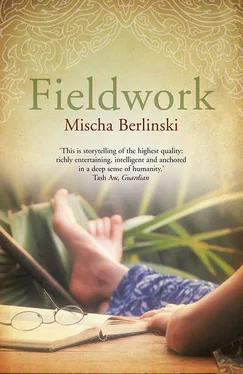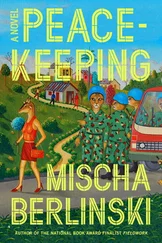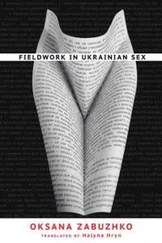Josh O'Connor had told me that Martiya had been in prison the past ten years. Tim Blair reported that she was a free woman, madly in love, as of fifteen years ago. Not long after she mailed this letter, by the time line I was constructing, Martiya had killed someone.
FOUR. "HELL YES, I REMEMBER MARTIYA VAN DER LEUN"
THE SWIDDEN,which had lain fallow all through the fall, again lay fallow. In Berkeley, I had tried to find Martiya's graduate thesis adviser, Joseph Atkinson, but he was, the department secretary said, a sick man, in and out of the hospital. I sent him an e-mail anyway, and received no response. I went back to Seattle, and Rachel and I went back to Thailand. It had been gray with a sleety rain when we left the States, but on the lawn outside the Chiang Mai airport, the airport employees were drinking whiskey, eating sticky rice, and playing the guitar.
The cool season came over Chiang Mai, and the Thai girls wore light cotton sweaters and shivered, although I was still comfortable in a T-shirt and shorts. It was a quiet winter. My editor at Executive asked if I wanted to write some film reviews. I saw no reason to be a snob. Rachel ate an omelette which did not agree with her and spent a week in the hospital, where the mysterious Dr. Bahn guided her recovery. Every morning, the Indian-born physician swept into her room, glanced at her chart, and settled himself into the chair beside her bed. He took Rachel's damp, green hand, and as he asked her the usual questions about her symptoms, continued to hold the limb sympathetically. He stayed at her bedside for almost an hour, and for the duration of his visit, her nausea abated. Her illness he treated as merely a manifestation of a deeper spiritual ailment, the cure for which, ideally, was the adoption of the Hindu rites of his childhood — that and antibiotics. He looked into Rachel's pale-blue eyes and talked — about Thai Buddhism, which in his view was nothing other than Hinduism itself in an elemental form about how animals recover from illness in the forest; about the forest and its sad destruction; and about the recent death of his father, and the beauty of the experience, despite its exceptional sorrow. The ghost of his father, he told us, was not yet at peace, and never left him.
"He's here, in this room?" asked Rachel.
"Oh yes," Dr. Bahn said. This was not something that should concern us: his father had been a most lovely man.
Rachel got better, and we took her class to the zoo. At the Chiang Mai zoo, feeding the animals is encouraged, and we bought bananas for the monkeys, peanuts for the elephants, and ice cream for the first-graders. Morris was thrilled. "My mother," Morris said, in the fluent mélange of his father's English and his mother's Thai that he spoke when excited, "she tell me I'm no allowed eat ice cream. She say, ‘Morris, you too fat!' " We got the ice cream from Dairy Queen, and Morris looked at his Blizzard with huge, passionate eyes. "I love you, Miss Rachel," he said finally.
Warm, easy winter days passed. Rachel and I started taking yoga lessons from an Austrian named Gunther, a former chef from Linz, who offered courses in a gazebo in his flower-strewn backyard, which was patrolled by a domesticated duck named Donut. Gunther had a great rivalry with the other German-speaking yoga teacher in Chiang Mai, a Bavarian who called himself Vivekananda. "Of course Vivekananda is very good yoga teacher," Gunther said, rubbing Donut's beak. "But I do not so much like his spirit."
Then one day in late January, we woke up sweating. The cool season was over, just like that, and not long after, Martiya's story broke open, like a coconut struck by a machete. Martiya's graduate adviser, Joseph Atkinson, had written me back. "Dear Mischa Berlinski," he began. "Hell yes, I remember Martiya van der Leun."
Rachel, like many women, had total faith in her ability to spot a romance, based on little more than a tender tone of voice or a lingering glance. She was convinced that Martiya van der Leun and her former professor were once lovers.
Handsome, dark-eyed, tall, a dramatic scar across his neck, the celebrated hero of numerous adventures in the African bush, Joseph Atkinson was a man of about sixty when a pretty undergraduate named Martiya van der Leun enrolled in his senior honors seminar. The seminar, entitled "Games People Play," was a semester-long examination of the role of play in human society. All human societies, Atkinson observed, from the Inuit to the French to the Pygmy, play; it was a fundamental human institution. But what do human beings consider play? It is not an easy word to define. The course considered work as a form of play, and play as a form of work; the games of children and the games of adults; games with consequences like baccarat, and games without, like tag; formal games like baseball, and informal games like hide-and-seek; games that mimicked war and games that mimicked daily life, as when children played house. Martiya wrote a long paper for Atkinson on the games children played in the Pipikoro villages of southern Sulawesi, drawing from her own experiences as a child. The notable feature of Pipikoro play, Martiya wrote, was the extreme complexity of the games played by even the youngest Pipikoro children: her catalogue of the rules of makulu ran to over thirty pages. Atkinson thought that with substantial revisions, the paper might be suitable for publication. Martiya visited him during office hours. Atkinson wrote that Martiya was small and vivacious: she had very pretty feet, and in warm weather she wore open-toed sandals; she was feminine but not womanly. She asked him about the Doyo, the tribal people he had studied in Africa. Really ? The only white man? She asked him what it was like to have dengue fever, and what tribal warfare was like. She even asked him about faculty meetings.
Rachel had been brushing her teeth as I read her Atkinson's letter, and she rinsed her mouth from the tap. "God knows only a lover would be interested in a faculty meeting," she said, spitting into the sink. "She was hot for him."
"You think?"
"Absolutely."
Rachel's logic had a certain force, and I imagined the sun-splashed sexually charged afternoons in the professor's study, as the small, vivacious undergraduate with pretty feet interrogated the learned but still manly professor. Did she play idly with her hair while Atkinson described the Doyo death rituals? Were there tribal masks on the wall? Did a woven kente cloth cover the couch? When she came by his office, did she perch herself daintily on the very edge of his couch and say, "Professor Atkinson, tell me a little about your work?"
Although he published only a handful of books— The Doyo Way of Life; Water, Wind, and Rain; The Life of Ralupeda, Doyo Shaman — Atkinson's influence dominated generations of anthropologists, including Martiya's. Anthropologists talk of the "school of Atkinson" as they talk of the school of Malinowski, or Evans-Pritchard, or Lévi-Strauss; and every freshman taking Anthropology 101 learns to construct the complicated Atkinson kinship groups. Atkinson wrote a vigorous, masculine prose, which is how I came to imagine the man himself. I wasn't surprised to learn that Atkinson, even at a place so filled with strangeness as Berkeley, was well known for his carefully cultivated eccentricities, as when he showed up for the initial meeting of the survey course in cultural anthropology, a lecture attended by nearly eight hundred startled undergraduates, wearing nothing but a handsome, three-foot long embroidered penis sheath. On another occasion, campus police were summoned on reports of a tall, nearly naked man wandering near Sather Gate with a finely honed spear. The situation was not calmed when Atkinson coolly explained that he was hunting the dean of students. Atkinson's e-mails to me were typically time-stamped around four in the morning California time, and I imagined him wrapped in a tattered bathrobe that exposed his bony knees, sitting at his computer, unable to fall back to sleep. The Internet makes possible some strange friendships. Atkinson made clear to me that for reasons of literary vanity, he did not wish to see his letters published, but I was free, he said generously, to summarize their contents.
Читать дальше












